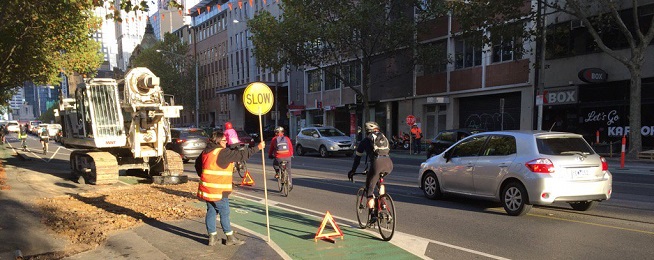The never-ending building boom in Melbourne has resulted in key bike routes being chopped, changed and squeezed every-which way so that cranes, gantries, pumpers and loading bays can occupy the adjoining road during construction.
That slice of road is often exactly where the bike lane is.
It is a pain, one that the government says it can salve, and solve.
At the end of this month it will introduce a road occupancy charge for the use of space occupied for construction on state managed roads.
This, according to the government, will act as an incentive for builders to reduce the time they spend disrupting road users.
If it does, that is half of the problem solved.
But the other half — even more important — is how the bike lane blockage is managed; its safety, legibility and convenience.
Think of it this way: if you were offered either a good route skirting the construction site for a prolonged period, or a risky by-pass for a shorter period, which would you choose?
Yes, sometimes shorter is better, but it depends.
In central Melbourne, where we ride mostly on council managed streets, things have got much better in recent years. The City of Melbourne works closely with builders, the traffic management consultants and Bicycle Network, to properly plan the sites, and minimise problems for riders.
But elsewhere Rafferty’s Rules frequently apply.
Private companies will pay a Road Occupation Charge to use inner-city arterial roads as part of building works or other activities from Wednesday 1 April 2020.
It will not apply to people temporarily occupying a road while moving house or renovating.
The scheme will apply to inner-Melbourne roads across 121 suburbs, from Beaumaris in the south east, Balwyn North in the east, Glenroy in the north west and Kingsville in the west.
This follows a successful trial across inner Melbourne in 2018, which saw a reduction in the length of road occupation periods by up to 75 per cent.
During the trial, one construction company reduced their occupation of a busy Melbourne intersection from 92 days to one day.
The Department of Transport will monitor the network to ensure companies are complying with the Road Occupation Charge, and all revenue collected will be re-invested into "congestion busting" initiatives.
That means more bike lanes, surely?
Become our friend
Find out more about Bicycle Network and support us in making it easier for people to ride bikes.


